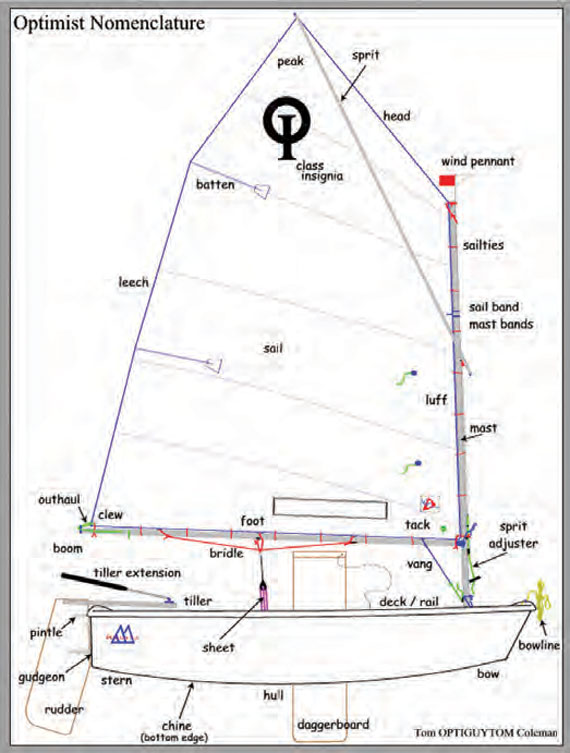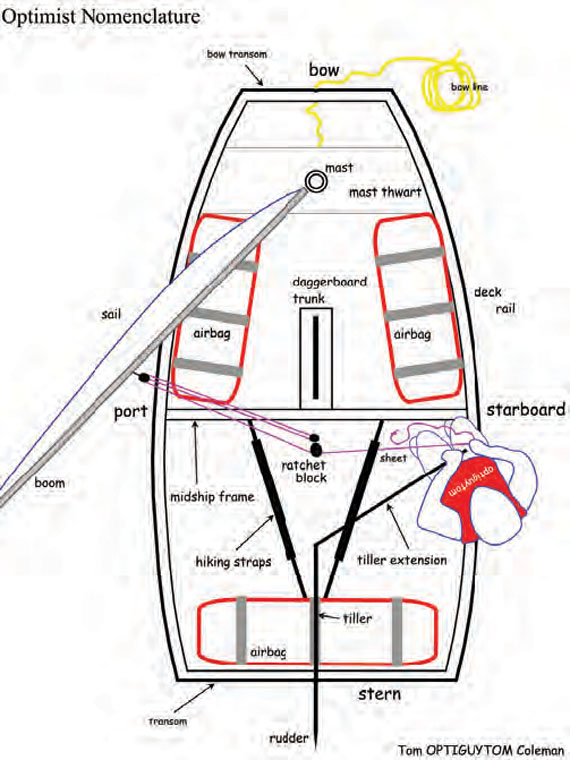by TOM COLEMAN
The Optimist; at first glance a simple little kids boat…right? The more you get to know this “simple” little kids’ boat, the more you realize it’s not so simple. But little Jimmy starts sailing class in a month and you’re told to provide a fully rigged Optimist for his use. Where do you start? What do you really need and what’s it all gonna cost? Tom “Optiguytom” Coleman, long associated with junior sailing, is considered internationally as an Optimist guru, especially when it comes to getting kids started in racing. In this article he helps parents get started into the world of the Optimist, unraveling the mysteries of understanding, choosing and purchasing an Optimist sailboat.
Optimist Basics
The Opti, or Optimist Dinghy, is relatively unchanged from the first prams designed and built by visionary Clark Mills in Clearwater, FL, 65 years ago. Testament to Mills’ genius, the Opti remains the largest and fastest growing sailboat class in the world, a phenomenon as THE definitive teaching boat for hundreds of thousands of children the world over.
The Opti is not for everyone. It was designed for children. Optis are sailed by kids as young as five* years old and can be officially raced by kids up to age fifteen. Although it’s possible for a parent to sail an Optimist alone or with a small child, realistically adult sized sailors just don’t fit well. That’s part of the magic behind why they work so perfectly for kids.
Mills originally designed the Opti to be garage-built out of $50 worth of materials… hence the “one sheet of plywood” nearly 4’x8’ size. Little did Clark know that one day two Optis could easily slide into the back of a Suburban or mini-van, or that Mom and a teen could lift it onto the car top, or that the spars (mast, boom, and sprit) could be shipped UPS or flown as baggage.

Why Buy Them Their Own Boat?
Many learn-to-sail programs provide Optis for participants, but some have gotten so popular that you will need to supply your own boat. Check with the program and solicit their recommendation on procuring a suitable Optimist. As a rule, Optis hold their value extremely well, making the overall investment quite reasonable. While a brand new, ready to race Optimist will start at less than $3,000, completely rigged Optis suitable for beginners can be had for less than $1,000. Another reason to buy your child their own Opti is the pride of ownership that comes from taking care of their own vessel. It’s a great way to build responsibility and help get them invested in this life-long activity.
What Will They Need to Start?
When we say Optimist, or Opti, we are talking about a complete, ready to sail package. Although there are many possible accessories and upgrades, this is what your child must have:
Hull – it’s the shell or body of the boat, the vessel itself. The vast majority are built of fiberglass. It includes the deck which runs around the top edge and is for sitting on, not standing. The hull also includes the mast thwart, daggerboard trunk and midship frame. These are all permanently attached during manufacture. Every hull has important parts attached mechanically (with screws), or secured by other means. These include hiking straps, ratchet block, dagger board bungee, three flotation bags, mainsheet, mast step (should be adjustable), and bow line.
Blades – sometimes called foils. They are the rudder (with tiller and extension) and the daggerboard.
Sail – usually white, made of Dacron.
Rig – often called spar set; these are the mast, boom, and sprit; the poles that support the sail. The rig includes the lines (ropes) and blocks (pulleys) that control the sail.
Accessories
Bailers – need two in the boat at all times, flimsy plastic bottles don’t work and are NOT safe.
Blade Bag – protects and stores the daggerboard and rudder, makes for easier carrying.
Life jacket – must be USCG Approved and appropriate size.
Whistle – secured to life jacket with a short lanyard.
Bow bumper – protects not only your investment but those of others.
Dolly – for dockside transport, launching, sometimes storage. Some programs require them.
Covers – depending on how boat will be stored a top or bottom cover may be a good investment.
Praddle – one handed paddle. Regular canoe or telescopic paddles DO NOT WORK!

New, Used, Chartered?
New complete Opti packages start at around $2700 while used Optis range from $500 on up depending on age, condition, and accessories. A third option is called a “chartered” or “event” Optimist. Think of these as demos, typically used at a few regattas by good sailors. Often these come with brand new spars and sail, carry new boat warranties, and sell for $200 – 300 below retail.
Club, Intermediate, Advanced, Premium Racer?
Those are names of various Opti packages differentiated by the equipment each comes with. Beginning sailors should be most interested in the “Club” or “Club Racer” version. Besides being the most economical, it’s designed for their level; a little heavier duty with less parts to loose or break. The Intermediate will have some upgrades mainly of interest to racing. The Advanced (read more expensive), are aimed at delivering a product suited exclusively toward competitive sailing and bear no advantage to those starting out. It’s important to know that the hull is really the same in each package and can be upgraded as the sailor progresses with the purchase of different spars, blades, and sails.
Where to Buy
Local Sailing Programs
Check the bulletin boards at local yacht clubs and community sailing centers and you’re likely to find at least a couple of formerly sailed Optis available. Ask around, during weekend and after school Opti classes (yes, most have already started), and you may uncover some unadvertised bargains.
Friendly Neighborhood Dealer
Shopping new or used Optis at your local dealership is perhaps the easiest way to obtain the right boat for your child. Typical small boat sales staff, as a rule, are local sailors and have insight on the surrounding programs and what each expects. You’ll find them to be very knowledgeable, highly enthusiastic, but not pushy.
The best deals can be found at the many spring open houses, boat swaps, or Opti auctions. You’ll be able to compare $600 fixer-uppers and $1,000 bargains (privately owned, taken in on commission) to used, chartered and brand new Optis, all at one location. The dealer can fix you up with necessary accessories, including roof racks to transport the newest addition to your family.
Internet
Online shopping can produce some real bargains, but has its limitations. eBay and Craig’s List occasionally have listings, but the drawback of buying sight unseen or traveling a long distance to see only one boat may not prove prudent. A recent search produced only one Opti on ebay and five scattered from New Jersey to Rhode Island.
JSALIS.org has a page of used Optis and equipment for sale as does the Opti Class at usoda.org.
Yes, but is it “Class legal”?
Class legal means that the hull, spars, sail and blades (and some accessories) meet certain rigid requirements pertaining to materials, measurements and construction. These requirements keep the Optimist safe for your child while ensuring that every Opti is virtually the same and one doesn’t have a significant advantage over another on the race course. Your Opti may be class legal if it has a sticker with a unique ISAF number or if very old, an IYRU number. The best guarantee is if you have the measurement papers issued by USODA (United States Optimist Dinghy Association) that came with the boat.
…and is it Necessary?
It’s only necessary if those holding the race say it is. Within your program it shouldn’t matter and most green fleet regattas (for beginners) are only concerned that it is safe and a reasonable facsimile. As your child progresses and begins to do more racing (regionally, nationally and even internationally), having a class legal Optimist is an “Opti-must”.
* It’s generally agreed that most kids are not developmentally ready for formal sailing instruction until 8 years of age.
Tom “OPTIGUYTOM” Coleman has been associated with the Optimist Class as a coach and instructor trainer for over a decade. He was Marketing Manager for McLaughlin Boat Works for nearly fifteen years. In 2004 he was chosen by the US Olympic Committee as Developmental Coach of the Year for Sailing. You’ll find him running the Green Fleet at many top Optimist regattas.
You can reach Tom for clinics and regatta coaching at Optiguytom@yahoo.com.





One thought on “Optimist Buying Guide”